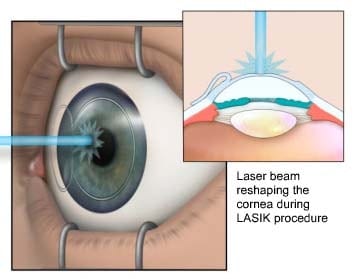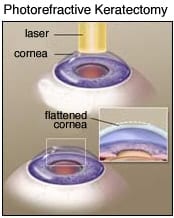
Visit
NH Lasik Associates
New Hampshire Lasik Associates are direct affiliates with Concord Eye Center and specialize in LASIK procedures. Visit their website to learn about what makes an ideal candidate and if LASIK is right for you.
LASIK
For clear vision to occur, the cornea in the front of the eye must have the correct shape and power to focus incoming light rays precisely on the retina at the back of the eye. If the cornea is too steep, too flat or irregular in shape, it cannot bend light at the angle needed to focus on the retina. Eyeglasses or contact lenses are often needed to refract the incoming light rays at the angle needed for clear vision.
Refractive surgery procedures, such as LASIK and Photorefractive Keratectomy (PRK) can reshape the cornea, focusing the light rays onto the correct location on the retina. This can reduce and in many cases even eliminate the need for glasses and contacts. If you are interested in finding out if you are a candidate for these procedures, please call 603-415-9583. Our Refractive Surgery Coordinator will be happy to discuss the process with you, answer your questions and conduct a no-charge LASIK screening to see how refractive surgery can help you.
Our state-of-the-art LASIK procedure uses the “all laser LASIK” technique to modify corneal shape and improve vision. First a femtosecond laser is used to force millions of tiny air bubbles in between the first and second, creating a corneal flap and exposing the underlying corneal tissue. Then an excimer laser is used to reshape the underlying layer, through a process called ablation. Once the corneal reshaping is complete, the flap is repositioned and allowed to heal.

Patients undergoing LASIK surgery can expect improved vision as soon as the day after the surgery. Patients are able to return to work in a day or two, though they must avoid strenuous activity for one week.
Photo-Refractive Keratectomy (PRK)
Photo-Refractive Keratectomy (PRK) is an alternate procedure to LASIK. During PRK, no flap is created. Instead, the surface epithelial cells are removed using an alcohol solution. Then, the excimer laser is used to reshape the cornea. Once the procedure is complete, the doctor will cover the cornea with a clear contact lens. This lens will stay in place for about a week while the cornea’s epithelial layer grows back.
Patients undergoing PRK experience a slower recovery than patients that have LASIK, but share the same excellent visual results once healing is complete. PRK may be more appropriate in patients with hyperopia (farsightedness), dry eye, thin corneas, or those with an irregular corneal surface.

Videos

Visit
NH Lasik Associates
New Hampshire Lasik Associates are direct affiliates with Concord Eye Center and specialize in LASIK procedures. Visit their website to learn about what makes an ideal candidate and if LASIK is right for you.

